Hate Crime in Scotland, 2023-24
Main points
The figures in this report relate to charges reported under legislation relating to hate crime which was in force up to 31 March 2024. The report does not contain figures relating to charges in terms of the Hate Crime and Public Order (Scotland) Act 2021, which came into force on 1 April 2024 and is therefore beyond the scope of this report.
In 2023-24, the total number of charges reported containing at least one element of hate crime was 5,992, 1.5% more than in 2022-23.
Racial crime remains the most commonly reported hate crime. In total 3,392 charges relating to race crime were reported in 2023-24, an increase of 4.6% compared to 2022-23. The 2023-24 total is the highest figure since 2015-16, although it is still 25% lower than the peak in 2011-12, when 4,547 charges were reported.
Sexual orientation aggravated crime is the second most commonly reported type of hate crime. The number of charges reported decreased by 5.7% in 2023-24 to 1,818. This is the first year the number of charges reported has decreased since 2014-15, but it is still 12% higher than the number in 2020-21.
The number of disability aggravated charges increased by 22% to 903 in 2023-24. This is the highest annual number of charges reported since the legislation creating this aggravation came into force in 2010 and continues an almost unbroken upward trend in the numbers since then.
There were 523 charges with a religious aggravation reported in 2023-24, 12% fewer than in 2022-23. This is the lowest annual number of charges reported since 2004-05.
There were 84 charges reported in 2023-24 with an aggravation of transgender identity, compared to 67 in 2022-23. This is the second highest annual number of charges recorded since this legislation came into force, two fewer than the 2021-22 figure of 86.
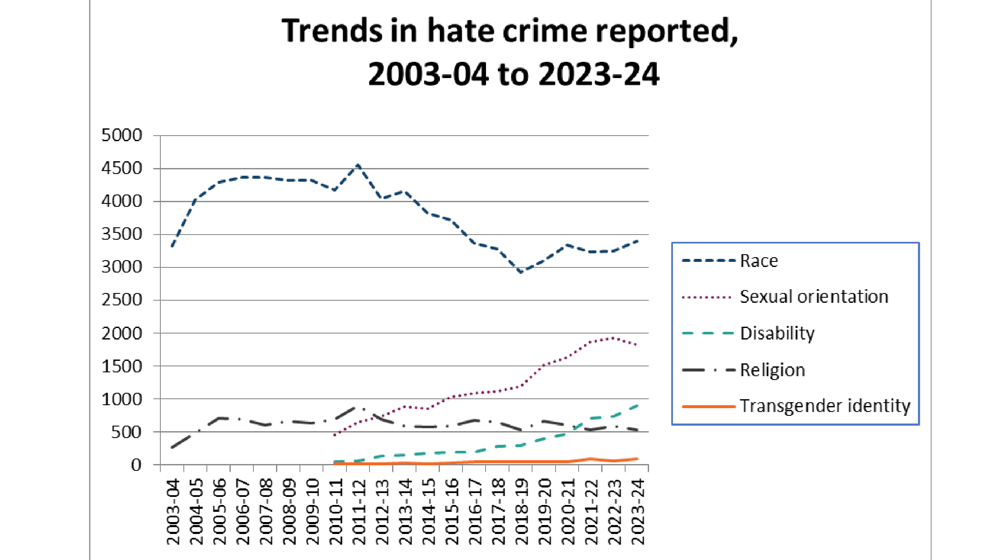
Introduction
This publication provides details of hate crime reported to the Procurator Fiscal in Scotland in 2023-24, and earlier years. The relevant legislative provisions are provided in the Annex.
As well as figures on each separate category of hate crime, figures on the total number of charges reported containing at least one element of hate crime are included in this publication. Additional information on the sex and age of accused is also provided.
The figures in this bulletin relate to charges reported under the legislation relating to hate crime which was in force up to 31 March 2024. New hate crime legislation, the Hate Crime and Public Order (Scotland) Act 2021 was passed by the Scottish Parliament on 11 March 2021 and received Royal Assent on 23 April 2021. The Act came into effect on 1 April 2024. Further details of the new legislation are given in the Annex. Figures under the new legislation will be published for 2024-25 onwards in future editions of this publication.
Background
The information in this publication is obtained from the Crown Office and Procurator Fiscal Service (COPFS) operational database. The database manages and processes reports submitted to Procurators Fiscal by the police and other reporting agencies throughout Scotland. Since this is a live database, the figures in this publication may differ slightly from those published in earlier years due to changes made during the investigation and prosecution of a case.
The information in this publication covers 2014-15 to 2023-24. There is also some information on longer term trends. The earliest year for which consistent figures are available for racial and religious crimes is 2003-04. Figures are available for disability, sexual orientation and transgender identity hate crime following legislation that came into force on 24 March 2010.
The figures quoted in this publication relate to the number of charges reported rather than the number of individuals charged or the number of incidents that gave rise to such charges. Where a charge has more than one hate crime aggravation, it is included in the overall figures for each type of hate crime into which it falls.
Detailed tables containing the figures referred to in this publication are available separately as an Excel spreadsheet - Hate Crime in Scotland data tables. There are also tables providing a geographical breakdown, by the Procurator Fiscal Office to which the charges were reported.
The tables include information on the initial decision taken by Procurators Fiscal on how a charge will proceed. This includes the decision to take court proceedings or to use alternatives to prosecution including fiscal fines and other Direct Measures. Further information on what is included in each decision category, including a breakdown of the reasons for taking no action, is provided in the Annex.
Race crime (Tables 1a, b, c and d, Table 11)
In total 3,392 charges relating to race crime were reported in 2023-24, an increase of 4.6% compared to 2022-23. The 2023-24 total is the highest figure since 2015-16, although it is still 25% lower than the peak in such charges in 2011-12, when 4,547 charges were reported.
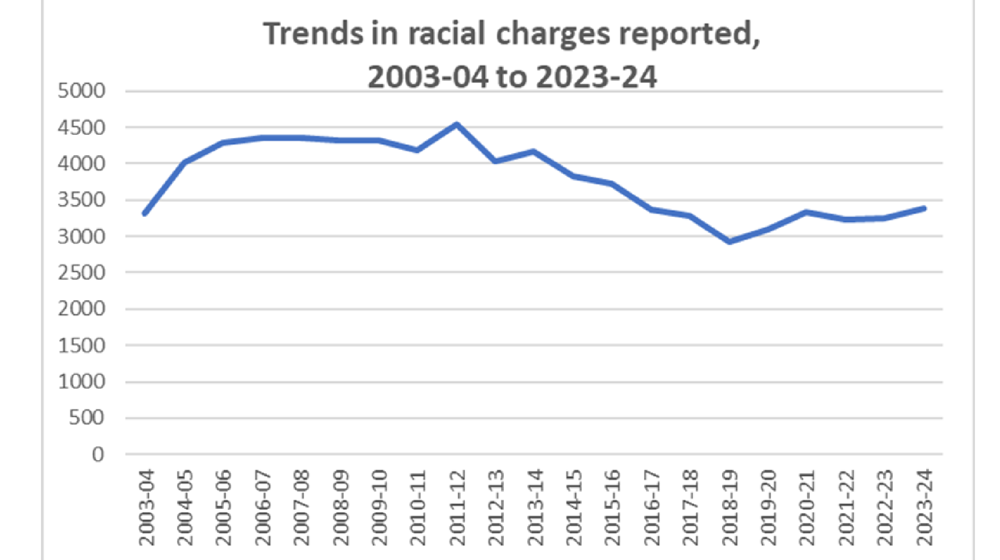
Court proceedings were commenced in respect of 76% of charges in 2023-24. In total, 88% of charges reported in 2023-24 led to court proceedings, including those not separately prosecuted but which may have been incorporated into other charges for the same accused which were prosecuted. The Annex includes a definition of charges not separately prosecuted.
No action was taken in respect of 2% of charges. The remaining charges received either a Direct Measure, a referral to the Children’s Reporter, or are awaiting a final marking decision.
The proportion of charges that specifically relate to charges of racially aggravated harassment and behaviour has fallen steadily over recent years, from 52% in 2014-15 to 27% in 2023-24. There has been a corresponding increase in the proportion of charges relating to other offences with a racial aggravation.
In order to prove any substantive charge, two sources of evidence are required. In contrast, evidence from a single source is sufficient to prove a racial aggravation which is attached to another substantive charge libelled.
In 2023-24, almost all charges of racially aggravated harassment and behaviour (927 out of 930 charges) were reported under section 50A of the Criminal Law (Consolidation) (Scotland) Act 1995. The remaining 3 charges were reported under the Public Order Act 1986.
In 2023-24, 70% of offences reported with a racial aggravation related to charges of threatening or abusive behaviour under section 38 of the Criminal Justice and Licensing (Scotland) Act 2010.
Religious crime (Tables 2a, b, c and d, Table 12)
There were 523 charges with a religious aggravation reported in 2023-24, which is 12% fewer than in 2022-23. This is the lowest annual number of charges reported since 2004-05.
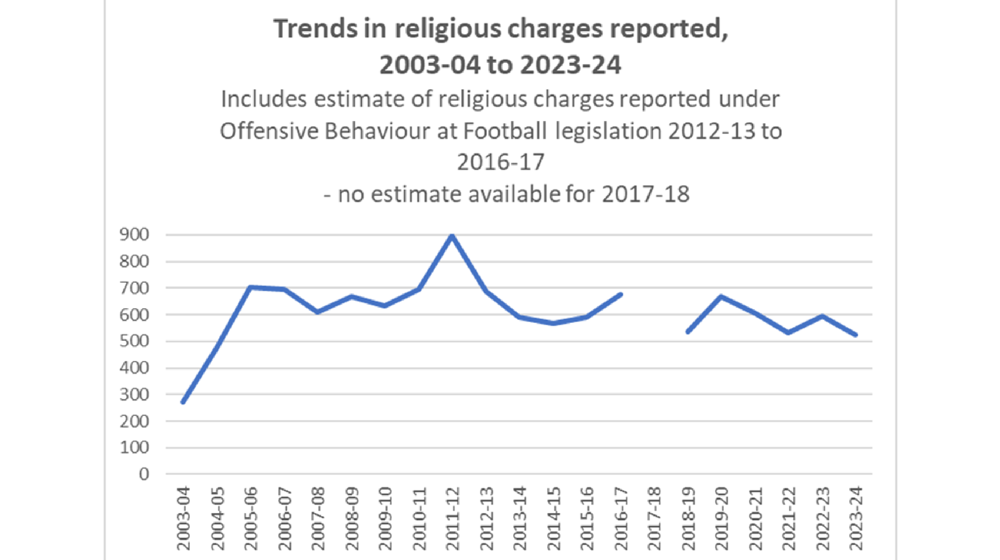
In the period 2012-13 to 2017-18 some charges that would otherwise have been reported with a religious aggravation will have been reported under the Offensive Behaviour at Football and Threatening Communications (Scotland) Act 2012. Research by the Scottish Government provided an estimate of how many additional religious charges there were under this Act in each year between 2012-13 and 2016-17. No estimate is available for 2017-18 due to the repeal of the Act.
Comparisons of the number of charges reported with a religious aggravation between 2012-13 and 2017-18 inclusive, and other years are therefore estimates only.
In 2023-24, court proceedings were commenced in respect of 80% of charges with a religious aggravation. In total, 88% of charges reported in 2023-24 led to court proceedings, including those not separately prosecuted but which may have been incorporated into other charges for the same accused.
No action was taken in respect of 2% of charges. The remaining charges received either a Direct Measure, a referral to the Children’s Reporter, or are awaiting a final marking decision.
In 2023-24, 79% of offences reported with a religious aggravation related to charges of threatening or abusive behaviour under section 38 of the Criminal Justice and Licensing (Scotland) Act 2010.
Disability (Table 3a, b and c, Table 13)
In 2023-24, 903 charges were reported with an aggravation of prejudice relating to disability, 22% more than in 2022-23. This is the highest annual number of charges reported since the legislation creating this aggravation came into force in 2010, and continues an almost unbroken upward trend in the numbers since then.
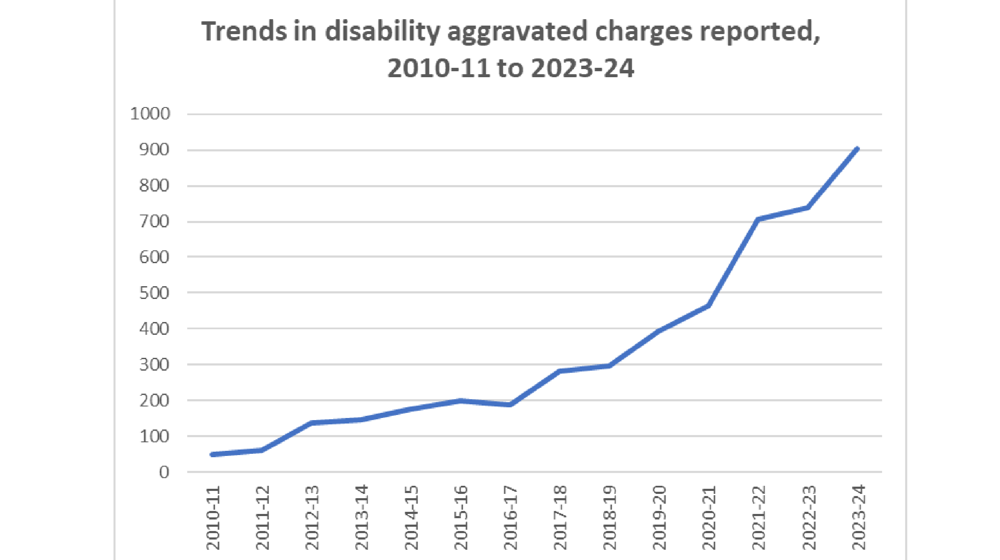
Court proceedings were commenced in respect of 84% of charges reported in 2023-24. In total 92% of charges led to court proceedings, including those not separately prosecuted, but which may have been incorporated into other charges for the same accused.
No action was taken in respect of 1% of charges reported in 2023-24. The remaining charges received either a Direct Measure, a referral to the Children’s Reporter, or are awaiting a final marking decision.
In 2023-24, 83% of offences reported with a disability aggravation related to charges of threatening or abusive behaviour under section 38 of the Criminal Justice and Licensing (Scotland) Act 2010.
Sexual orientation (Table 4a, b and c, Table 14)
In 2023-24, 1,818 charges were reported with an aggravation of prejudice relating to sexual orientation, 5.7% fewer than in 2022-23. This is the first year the number of charges reported has decreased since 2014-15, but it is still 12% higher than the number in 2020-21.
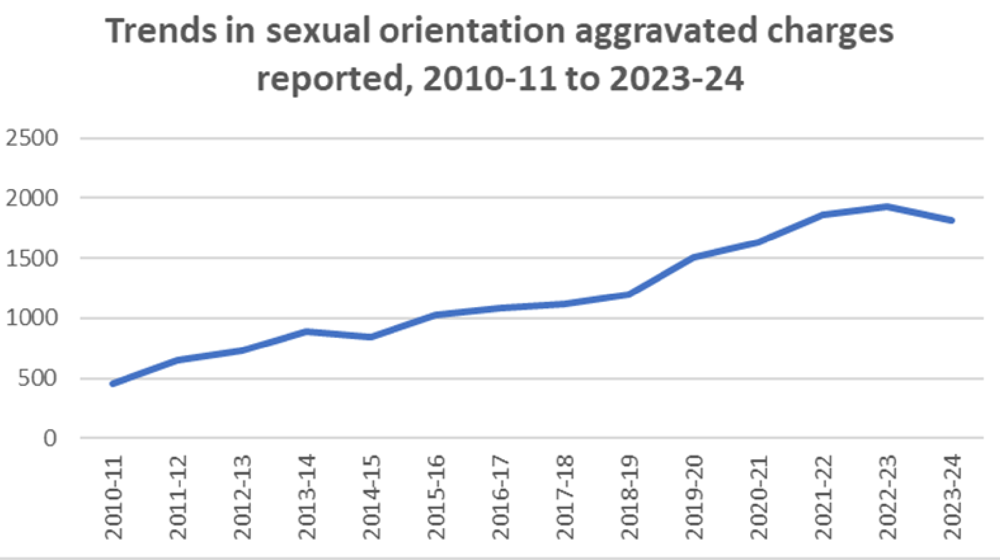
Court proceedings were commenced in respect of 81% of charges reported in 2023-24. In total 90% of charges led to court proceedings, including those not separately prosecuted, but which may have been incorporated into other charges for the same accused.
No action was taken in respect of 2% of charges. The remaining charges received either a Direct Measure, a referral to the Children’s Reporter, or are awaiting a final marking decision.
In 2023-24, 86% of offences reported with a sexual orientation aggravation related to charges of threatening or abusive behaviour under section 38 of the Criminal Justice and Licensing (Scotland) Act 2010.
Transgender identity (Table 5a, b and c, Table 15)
In 2023-24, 84 charges were reported with an aggravation of prejudice relating to transgender identity, 17 (or 25%) more than the 67 charges reported in 2022-23. The 2023-24 figure is the second highest annual number of charges recorded since this legislation came into force, two fewer than the 2021-22 figure of 86.
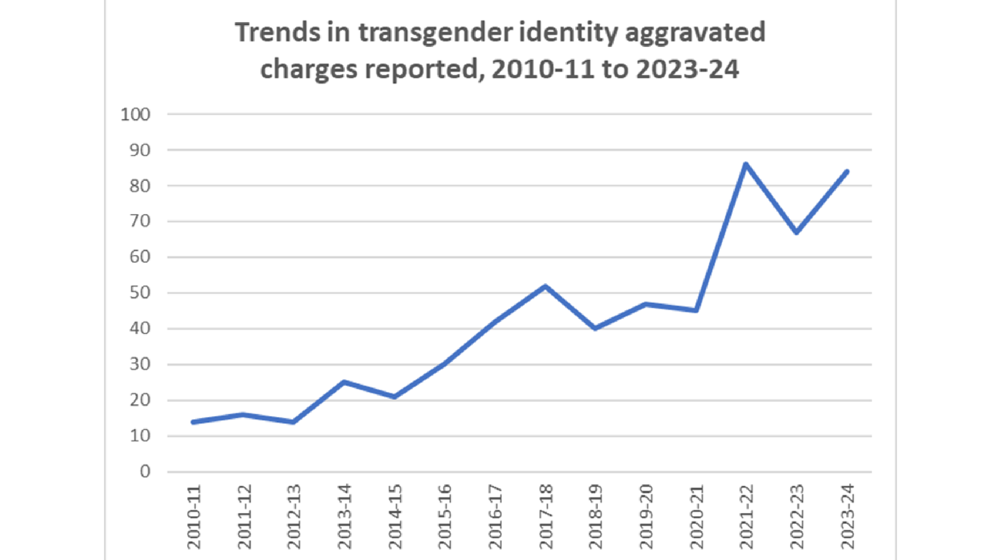
Court proceedings were commenced in respect of 71% (60 out of 84) of charges reported in 2023-24. In total 75% (63 out of 84) of charges led to court proceedings, including those not separately prosecuted, but which may have been incorporated into other charges for the same accused.
No action was taken in respect of 2% (2 out of 84) of charges reported in 2023-24. The remaining charges received either a Direct Measure or a referral to the Children’s Reporter.
In 2023-24, 69% (58 out of 84) of offences reported with a transgender aggravation related to charges of threatening or abusive behaviour under section 38 of the Criminal Justice and Licensing (Scotland) Act 2010.
Total hate crime (Tables 6a and b)
If a charge has more than one hate crime aggravation, it is included in this publication in each type of hate crime into which it falls. It is therefore not possible to add up the charges for each category of hate crime to obtain the total number of hate crime charges reported. Table 6a provides this information, with charges which relate to more than one category of hate crime counted only once.
In 2023-24, 5,992 charges with at least one hate crime element were reported, 1.5% more than the total of 5,905 in 2022-23. This is the highest number reported since 2011-12.
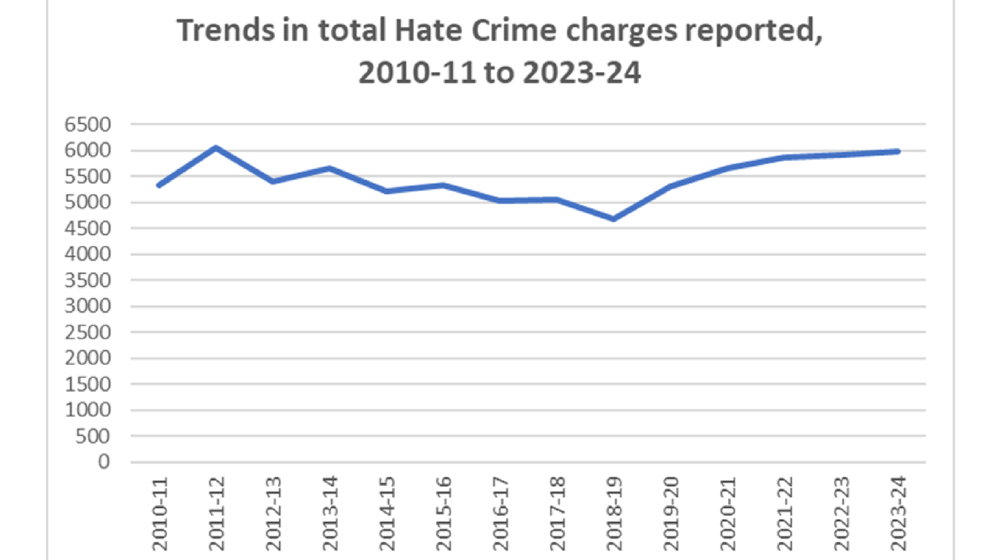
The majority of hate crime charges contain a racial element. However, the proportion that contain a racial element has generally decreased over the last ten years, from 73% in 2014-15 to 57% in 2023-24. The proportion of hate crime charges that relate to sexual orientation has increased from 16% to 30% over the same period, while the proportion that relate to disability has increased from 3% to 15%. In 2023-24 the proportion of religiously aggravated charges was 9% and the proportion of transgender identity related charges was 1%.
Sex and age of accused (Tables 7a and b, 8a and b)
In 2023-24, of the 5,992 accused in charges which contained at least one hate crime element, 4,736 or 79% were male. Accused were relatively more likely to be male for religiously aggravated charges (89%) and relatively less likely to be male for transgender identity charges (75%).
In 2023-24, 7% of accused in charges which contained at least one hate crime element were aged under 18, with a further 7% aged 18 to 20. Accused aged over 40 made up 37% of the total. Accused were relatively more likely to be aged 20 or younger for transgender identity charges (27%) and relatively less likely to be aged over 40 for disability charges (24%).
The information on sex is as recorded by the police. Further details of the basis of the recording are included in the Annex. The figures by age and sex exclude any charges where this information was not recorded.
Annex
Legislation
Race crime is defined as any charge of racially aggravated harassment and behaviour in terms of Section 50A of the Criminal Law (Consolidation) (Scotland) Act 1995 or Section 18, 19, 21 or 23(1)a of the Public Order Act 1986 or any substantive charge that is racially aggravated in terms of Section 96 of the Crime and Disorder Act 1998.
To prove a charge of racially aggravated harassment and behaviour, two separate sources of evidence establishing the racial element are required.
In terms of Section 96 of the Crime and Disorder Act 1998, evidence from a single source is sufficient to prove a racial aggravation. The aggravation must be attached to another substantive charge.
Religiously aggravated offences are defined as substantive charges that include an aggravation of religiously motivated behaviour in terms of Section 74 of the Criminal Justice (Scotland) Act 2003.
Disability aggravated offences are defined as substantive charges that include an aggravation of prejudice relating to disability in terms of Section 1 of the Offences (Aggravation by Prejudice) (Scotland) Act 2009.
Sexual orientation aggravated offences are defined as substantive charges that include an aggravation of prejudice relating to sexual orientation in terms of Section 2 of the Offences (Aggravation by Prejudice) (Scotland) Act 2009.
Transgender identity aggravated offences are defined as substantive charges that include an aggravation of prejudice relating to transgender identity in terms of Section 2 of the Offences (Aggravation by Prejudice) (Scotland) Act 2009.
Legislation – from 1 April 2024
The Hate Crime and Public Order (Scotland) Act 2021 was passed by the Scottish Parliament on 11 March 2021 and received Royal Assent on 23 April 2021. The Act came into effect on 1 April 2024, and will apply to offences committed from that date onwards. Any offences committed before that date will continue to be reported and prosecuted under the old legislation. Figures under the new legislation will be published for 2024-25 onwards in future editions of this publication.
The Act seeks to modernise, consolidate and extend hate crime legislation in Scotland. The Act added two new groups to the list of protected characteristics currently covered by hate crime legislation: Age and Variations in Sex Characteristics. All the aggravations operate in the same way as those previously in existence.
The Act also created a new suite of offences relating to stirring up of hatred that apply in relation to all seven characteristics covered by the Act. Previous stirring up legislation only applied to the characteristic of race.
The Act also abolished the common law offence of blasphemy.
Definitions
Not separately prosecuted include charges which were not prosecuted, but where other charges for the same accused within the same case were prosecuted. In some cases, the charges which were prosecuted may have included details from the charges which were not prosecuted. For example, two charges reported by the police may have been merged into one comprehensive charge and then prosecuted.
Direct Measures include fiscal fines, fiscal compensation orders, fiscal work orders, warning letters and referral to diversion from prosecution schemes. The direct measures figures include a small number of charges which were not actioned, but where the accused was given a direct measure in respect of other charges within the same case. In some cases, the charges which were given a direct measure may have included details from the charges which were not actioned.
No action includes charges where a decision was taken not to proceed. This will include charges where there is insufficient evidence to proceed or where further action would be disproportionate. Table A below gives a breakdown of the reasons for no action in 2023-24.
Cases awaiting decision include those where no decision has yet been taken, and also those which have been reviewed and have been marked for “further enquiries” i.e. where more information is required before a final decision can be taken on whether to proceed.
Table A: Total number of charges where no action was taken, by reason, 2023-24
|
|
Racial |
Religious |
Disability |
Sexual orientation |
Transgender |
|---|---|---|---|---|---|
|
Total number of charges – no action |
82 |
11 |
10 |
38 |
2
|
|
Not a crime |
2 |
0 |
0 |
5 |
0 |
|
Insufficient admissible evidence |
37 |
6 |
6 |
14 |
1 |
|
Further action disproportionate |
6 |
1 |
0 |
6 |
0 |
|
Mitigating circumstances |
3 |
0 |
0 |
0 |
1 |
|
Other |
34 |
4 |
4 |
13 |
0 |
Use of terms Sex and Gender
'Sex' can be considered to refer to whether someone is male or female based on their physiology, with 'gender' representing a social construct or sense of self that takes a wider range of forms.
Sex, as referred to in this bulletin, is generally identified by a police officer based on their assessment of whether a person presents as male or female. In most cases this is based on the physiology of a person rather than self-identified gender. It is recorded for operational purposes, such as requirements for searching. It is also included in the information reported to COPFS. However, in order to prosecute crime, information regarding the sex or gender of accused persons is not essential. It should be noted that COPFS will respect and use the chosen name and pronouns of an accused person in all communications with them.
In this report we refer to 'sex' rather than 'gender' because this better reflects recording practices in relation to this information. In reality, it is likely that recording includes a mixture of physiological and personal identity. The sex of a small number of accused is not recorded, where the police have not provided this information to COPFS.
Convictions
The figures in this publication relate to initial decisions taken by the Procurator Fiscal. Many of the charges reported in the most recent year, 2023-24, will not yet have reached a conclusion, so information on the final number convicted is not yet available.
Figures on convictions are published by the Scottish Government in Criminal Proceedings in Scotland statistics . Please note that there are significant differences in the way the Criminal Proceedings statistics measure activity in comparison to the figures in this report. In particular, this publication is based on charges reported, while the Criminal Proceedings figures are based on persons prosecuted or convicted, by main charge only. One person can be reported with one or more charges against them. Additionally, this publication is based on the year the charge was reported to COPFS. The Criminal Proceedings figures are based on the year of disposal. These differences are described in more detail in Annex C of the Criminal Proceedings publication.
Conviction information on aggravations is available in Tables 11 and 12 of the latest Criminal Proceedings publication. Please note that figures for race crime cover convictions with racial aggravations only and do not include conviction information for racial charges, which accounted for 27% of racial crime in 2023-24.
The date of publication for convictions for 2022-23 will be made known when finalised on the Forthcoming Publications page of the Scottish Government website https://www2.gov.scot/Topics/Statistics/ForthcomingPubs
The Offensive Behaviour at Football and Threatening Communications (Scotland) Act 2012
The Offensive Behaviour at Football and Threatening Communications (Scotland) Act 2012 came into force on 1 March 2012 and was repealed on 20 April 2018. Previous editions of this publication prior to the repeal provided figures on the number of charges reported under the Act. There are no charges recorded on the COPFS database reported under the Act after 2017-18. If a charge reported in an earlier year under the Act contained a hate crime aggravation it will still be included in the overall figures for each type of hate crime into which it falls.
At the time of the repeal, COPFS conducted a review of all ongoing charges under the Act. This resulted in a number of such charges being amended to an alternative charge.
In many cases, charges under the Act did not include an aggravation, because the charge itself covered the relevant behaviour. However, in certain subsections of the Act, the charge did not include the behaviour against specific individuals or groups covered by the hate crime categories and in these instances the charge may have been reported with an aggravation. Where a charge that would previously have been reported and prosecuted under the Act has been amended to an alternative charge, that alternative charge may now include a statutory aggravation.
The repeal of the Act means that there is a discontinuity in the time series of figures given in this publication between 2016-17 and 2017-18. Figures for all categories of hate crime may be higher in 2017-18 and subsequent years than they otherwise would have been due to charges that would have been reported between 2013-14 to 2016-17 under the Offensive Behaviour at Football and Threatening Communications (Scotland) Act 2012 being reported as an alternative charge with an aggravation.
Conviction information on the Offensive Behaviour at Football and Threatening Communications (Scotland) Act 2012 is available in Annex E of the Criminal Proceedings in Scotland 2018-19 publication. Criminal Proceedings in Scotland, 2018-19, Annex E
Related Scottish Government publications
The Scottish Government published a report in May 2024 Hate crimes recorded by the police in Scotland, 2022-23. This report presents updated information on the number of hate crimes recorded by the police in Scotland during 2022-23 (along with previously published time series analysis since 2014-15). It includes information on hate crimes recorded by the police by crime, by associated hate aggravation(s), and by local authority area.
The Scottish Government published a report in January 2023 Police recorded hate crime - characteristics: updated study This provides an update on work by Scottish Government statisticians and Police Scotland to review the availability of information on hate crime recorded by the police in Scotland. It includes new details on the characteristics of hate crime, based on a random sample of cases recorded by the police in 2020-21. This is a follow up study to the previous report Characteristics of police recorded hate crime in Scotland published in 2021.
The Scottish Government previously published research based on COPFS data which provides details of the circumstances of charges with religious aggravations. This includes information on the religion targeted, the location where the offence was committed, and the age and gender of the accused. Research has been published relating to charges reported in each year from 2010-11 to 2017-18.
The Scottish Government also previously published research which provides details of the circumstances of charges reported in each year from 2012-13 to 2016-17 under the Offensive Behaviour at Football and Threatening Communications (Scotland) Act 2012. This includes information on the location where the offence was committed including the football stadium if appropriate, the nature of the offensive behaviour, the age and gender of the accused and their football team affiliation. Due to the repeal of the Act, no similar research was published relating to charges reported in 2017-18.
Data sources, data quality and revisions
The information in this publication is taken from the COPFS operational database used to manage the processing of reports submitted to Procurators Fiscal by the police and other reporting agencies throughout Scotland. Since this is a live database, the figures given here may not exactly match those previously published. For instance, if the Procurator Fiscal amends a charge, the database only holds details of the amended charge.
This publication contains new figures for 2023-24, and revised figures for the previous two years. These reflect the most up-to date information recorded on the COPFS operational database at the time the publication was prepared (May 2024). Changes to the information recorded for earlier years are minimal, and no revisions have been made to these years.
The data included in this publication has undergone a series of validation checks. Where internal inconsistencies in the data, or missing information, have been identified, data on individual charges has been checked manually and corrected if necessary. This includes cross checking with information contained in case related documents where appropriate. Where necessary, data has also been cross checked with external sources, in particular data held by the Scottish Courts and Tribunal Service (SCTS) on cases that have come to court.
Checks have also been carried out on a sample of charges to ensure that the aggravation recorded has been added appropriately, with any errors identified corrected as necessary. This checking has primarily focused on disability aggravated charges because historically this is the category of hate crime where most mistakes have been discovered.
The total number of charges relating to the hate crime category of transgender identity is small. The percentages derived from these figures should therefore be treated with caution, because they are based on small numbers.
Percentages may not add up to 100% due to rounding.
An official statistics publication for Scotland
These statistics are official statistics. Official statistics are statistics that are produced by crown bodies, those acting on behalf of crown bodies, or those specified in statutory orders, as defined in the Statistics and Registration Service Act 2007.
COPFS statistics are regulated by the Office for Statistics Regulation (OSR). OSR sets the standards of trustworthiness, quality and value in the Code of Practice for Statistics that all producers of official statistics should adhere to.
Correspondence and enquiries
For enquiries about this publication please contact:
Fiona Roberts
Management Information Unit
Crown Office and Procurator Fiscal Service
Email: _ManagementInformationUnit@copfs.gov.uk
Thank you for your feedback.